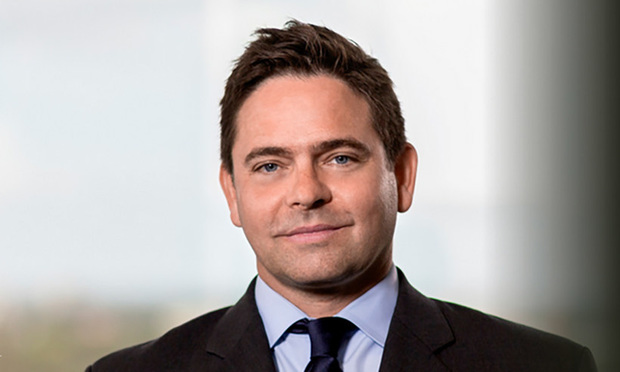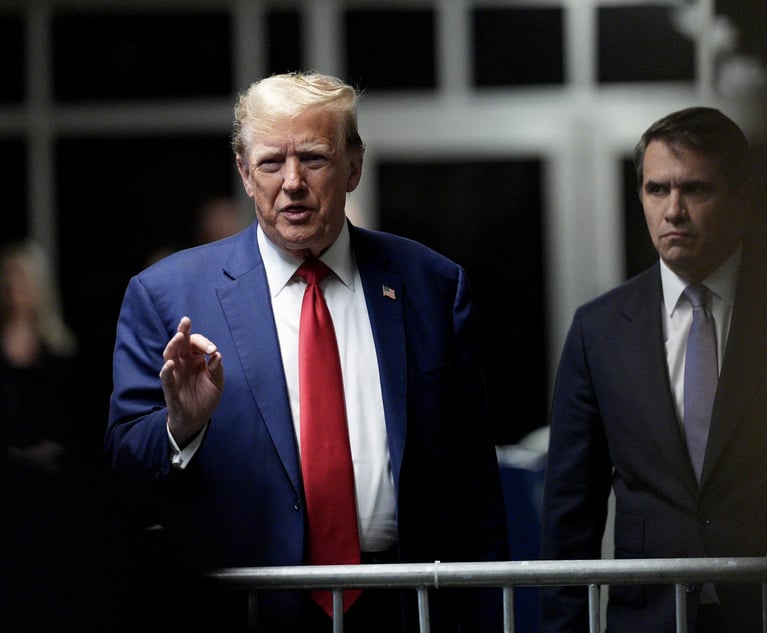Ex-Foley & Lardner Partner Hit With 27-Month Sentence in Insider Trading Case
Walter "Chet" Little, formerly a banking and real estate partner at two large law firms, was sentenced Thursday after entering a guilty plea in November.
February 23, 2018 at 02:28 PM
4 minute read
 Walter “Chet” Little.
Walter “Chet” Little. A New York federal judge on Thursday sentenced Walter “Chet” Little, a former Foley & Lardner and Bradley Arant Boult Cummings lawyer, to more than two years in prison after he pleaded guilty to a conspiracy charge last year in an insider trading case.
Little's sentence, handed down by Manhattan U.S. District Judge Katherine Polk Failla, calls for the former Big Law real estate and banking partner to serve 27 months in prison and forfeit just shy of $453,000, according to the U.S. Attorney's Office for the Southern District of New York, which prosecuted the case. The sentencing followed Little's guilty plea in November to a charge of conspiracy to commit securities fraud.
Little, 44, was arrested and charged in May—less than a year after he joined Bradley Arant's Tampa, Florida, office from Foley & Lardner, where he had worked for more than a decade as an associate and partner. Prosecutors accused him of using his access to confidential information while at Foley & Lardner to help himself and a business associate, co-defendant Andrew Berke, collectively earn about $1 million in illicit profits through options and stock trades.
Prosecutors said Little accessed nonpublic information related to expected mergers and earnings releases for companies that Foley & Lardner represented, including Oshkosh Corp., Whiting Petroleum Corp. and Harley-Davidson Inc., although he did not work directly for any of those clients. Little was accused of trading based on that confidential information, earning hundreds of thousands of dollars as a result, and of passing the information to Berke, who also made trades based on that information. Berke has also entered a guilty plea in the criminal case and is scheduled for sentencing in April, according to the U.S. Attorney's Office.
“Walter Little, a law firm partner with access to sensitive nonpublic client information, selfishly chose to exploit it for personal gain rather than safeguard it,” U.S. Attorney Geoffrey H. Berman of the Southern District of New York said in a statement on Thursday following Little's sentencing hearing. “Today's sentence underscores the seriousness of insider trading, as Little will now serve serious time in prison.”
Under a plea agreement struck with federal prosecutors in October, Little had faced a maximum sentence of up to five years in prison. After a change-of-plea hearing in November, however, Little's defense lawyer, Todd Foster of Tampa, said he planned to provide a “great deal” of evidence that he hoped would mitigate Little's sentence.
Earlier this month, Foster filed a sentencing memorandum on Little's behalf, arguing that he deserved a lesser sentence for several reasons, including that his career as a lawyer could end in permanent disbarment in light of a felony conviction and that Little faces a “crippling tax burden” of more than $300,000 in connection with his termination from Foley & Lardner.
Foster also wrote that Little was actively participating in a Florida bar-sponsored drug and alcohol rehabilitation program and that, during the period of the insider trading conspiracy, “Little suffered from undiagnosed bipolar disorder, a mental condition which, left unchecked, resulted in distorted judgment and reasoning.”
In addition to the sentencing memo, Little and his lawyer submitted 25 pages of letters from family, friends, law school classmates and clients, all pleading for leniency.
On Friday, Foster said the judge “saw fit to grant a downward variance” from the maximum sentence Little could have faced.
“Chet Little took responsibility for his actions and we presented what we felt was substantial mitigation, including mental health and family circumstances evidence to the court,” said Foster. “Mr. Little now begins the process of serving his time and rebuilding his life.”
Following Little's arrest, Foley & Lardner said it had let him go after an internal investigation showed that he violated firm policies and that the firm cooperated with authorities. Bradley Arant, meanwhile, took swift action to dismiss Little after it learned of charges against him.
There was no indication that either Foley & Lardner or the federal government notified Bradley Arant about the investigation before Little switched firms in the summer of 2016. Discussing those circumstances in May, legal ethics experts said Foley & Lardner didn't have an obligation to tip off Bradley Arant.
Little and Berke continue to face a parallel civil suit brought by the U.S. Securities and Exchange Commission. That case is pending in Manhattan federal court, according to court records.
This content has been archived. It is available through our partners, LexisNexis® and Bloomberg Law.
To view this content, please continue to their sites.
Not a Lexis Subscriber?
Subscribe Now
Not a Bloomberg Law Subscriber?
Subscribe Now
NOT FOR REPRINT
© 2025 ALM Global, LLC, All Rights Reserved. Request academic re-use from www.copyright.com. All other uses, submit a request to [email protected]. For more information visit Asset & Logo Licensing.
You Might Like
View All
Jay Clayton, Ex-SEC Chief and Sullivan & Cromwell Lawyer, Eyed For Manhattan US Attorney's Office

Legal Speak's 'Sidebar with Saul' Part II: GOP Pols Push Misinformation, Cohen Keeps It Together
1 minute read
Legal Speak: Aaron Sorkin This Is Not - Trump Trial with Emily Saul (Part 1)
2 minute read
Pillsbury Partner Representing Sean 'Diddy' Combs Following Homeland Security Raid
Trending Stories
- 1OCR Issues 'Dear Colleagues' Letter Regarding AI in Medicine
- 2Corporate Litigator Joins BakerHostetler From Fish & Richardson
- 3E-Discovery Provider Casepoint Merges With Government Software Company OPEXUS
- 4How I Made Partner: 'Focus on Being the Best Advocate for Clients,' Says Lauren Reichardt of Cooley
- 5People in the News—Jan. 27, 2025—Barley Snyder
Who Got The Work
J. Brugh Lower of Gibbons has entered an appearance for industrial equipment supplier Devco Corporation in a pending trademark infringement lawsuit. The suit, accusing the defendant of selling knock-off Graco products, was filed Dec. 18 in New Jersey District Court by Rivkin Radler on behalf of Graco Inc. and Graco Minnesota. The case, assigned to U.S. District Judge Zahid N. Quraishi, is 3:24-cv-11294, Graco Inc. et al v. Devco Corporation.
Who Got The Work
Rebecca Maller-Stein and Kent A. Yalowitz of Arnold & Porter Kaye Scholer have entered their appearances for Hanaco Venture Capital and its executives, Lior Prosor and David Frankel, in a pending securities lawsuit. The action, filed on Dec. 24 in New York Southern District Court by Zell, Aron & Co. on behalf of Goldeneye Advisors, accuses the defendants of negligently and fraudulently managing the plaintiff's $1 million investment. The case, assigned to U.S. District Judge Vernon S. Broderick, is 1:24-cv-09918, Goldeneye Advisors, LLC v. Hanaco Venture Capital, Ltd. et al.
Who Got The Work
Attorneys from A&O Shearman has stepped in as defense counsel for Toronto-Dominion Bank and other defendants in a pending securities class action. The suit, filed Dec. 11 in New York Southern District Court by Bleichmar Fonti & Auld, accuses the defendants of concealing the bank's 'pervasive' deficiencies in regards to its compliance with the Bank Secrecy Act and the quality of its anti-money laundering controls. The case, assigned to U.S. District Judge Arun Subramanian, is 1:24-cv-09445, Gonzalez v. The Toronto-Dominion Bank et al.
Who Got The Work
Crown Castle International, a Pennsylvania company providing shared communications infrastructure, has turned to Luke D. Wolf of Gordon Rees Scully Mansukhani to fend off a pending breach-of-contract lawsuit. The court action, filed Nov. 25 in Michigan Eastern District Court by Hooper Hathaway PC on behalf of The Town Residences LLC, accuses Crown Castle of failing to transfer approximately $30,000 in utility payments from T-Mobile in breach of a roof-top lease and assignment agreement. The case, assigned to U.S. District Judge Susan K. Declercq, is 2:24-cv-13131, The Town Residences LLC v. T-Mobile US, Inc. et al.
Who Got The Work
Wilfred P. Coronato and Daniel M. Schwartz of McCarter & English have stepped in as defense counsel to Electrolux Home Products Inc. in a pending product liability lawsuit. The court action, filed Nov. 26 in New York Eastern District Court by Poulos Lopiccolo PC and Nagel Rice LLP on behalf of David Stern, alleges that the defendant's refrigerators’ drawers and shelving repeatedly break and fall apart within months after purchase. The case, assigned to U.S. District Judge Joan M. Azrack, is 2:24-cv-08204, Stern v. Electrolux Home Products, Inc.
Featured Firms
Law Offices of Gary Martin Hays & Associates, P.C.
(470) 294-1674
Law Offices of Mark E. Salomone
(857) 444-6468
Smith & Hassler
(713) 739-1250










